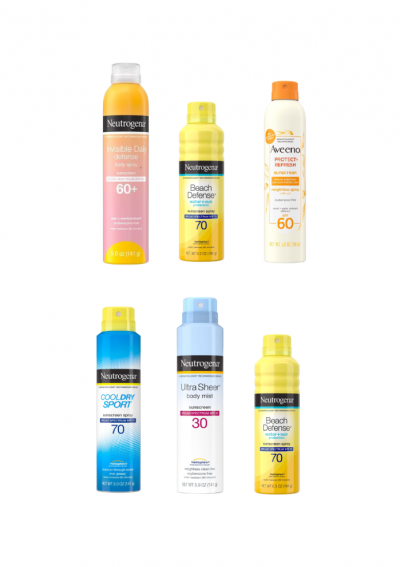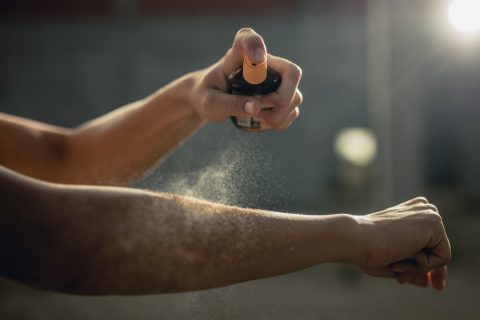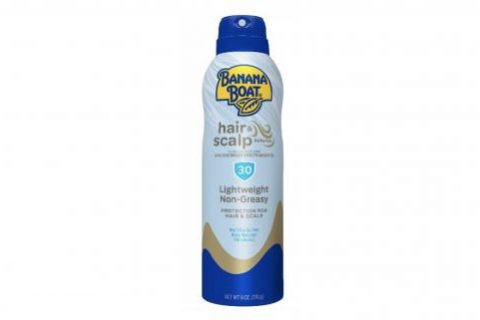Sunscreen Lawsuits
Sunscreen lawsuits are legal claims against sunscreen manufacturers including Johnson & Johnson, Neutrogena, Aveeno and others for making products that contain the toxic chemical benzene. Exposure to high levels of benzene may cause leukemia and other cancers in humans.

Why Are Sunscreen Lawsuits Being Filed?
People are filing sunscreen lawsuits against Johnson & Johnson, Aveeno and Neutrogena because these companies manufactured products containing benzene, which may have led plaintiffs to develop cancer.
Consumers purchased J&J’s sunscreens to decrease their risk of skin cancer. Little did they know J&J’s products contained an undisclosed carcinogen, benzene, that potentially increases their chances of developing the very cancer the product is marketed to prevent.
J&J marketed its sunscreen products as safe, but instead they were “dangerous and unfit for use” because they contained benzene, according to Minett Fernandez’s lawsuits against Johnson & Johnson.
Benzene
Benzene is a toxic chemical used to make products such as plastic, rubber and pesticides, but forest fires and volcanoes also create it naturally.
The World Health Organization’s International Agency for Research on Cancer (IARC) classifies benzene as a human carcinogen based on evidence that it causes acute myeloid leukemia (AML), according to the American Cancer Society.
In addition, some studies have also linked it to acute lymphocytic leukemia (ALL), chronic lymphocytic leukemia (CLL), multiple myeloma, and non-Hodgkin lymphoma.
According to a 2021 study published in BMJ, benzene is thought to cause cancer by creating chronic inflammation and suppressing the immune system.
Recalled J&J Sunscreen Products
On July 14, 2021, Johnson & Johnson, Aveeno and Neutrogena recalled five aerosol sunscreens because lab testing found low levels of the cancer-causing chemical benzene in the products.
These recalled products are the focus of sunscreen lawsuits, but other sunscreens that are found to contain benzene could be included even if manufacturers haven’t recalled them.
- Aveeno Protect + Refresh aerosol sunscreen
- Neutrogena Invisible Daily defense aerosol sunscreen
- Neutrogena Beach Defense aerosol sunscreen
- Neutrogena Cool Dry Sport aerosol sunscreen
- Neutrogena Ultra Sheer aerosol sunscreen
The companies are still investigating how the carcinogen ended up in the products, but Johnson & Johnson said the amounts found in their products aren’t expected to cause adverse health consequences, according to a company statement.
Valisure, an online pharmacy, filed an FDA citizen petition shortly before J&J issued its recalls. According to the company’s testing, several of J&J’s products contained amounts of benzene well over the acceptable limits established by the FDA and Environmental Protection Agency.
While J&J recalled these five products, Valisure found other J&J products that contained high levels of benzene, and these remain on the market.
Banana Boat Sunscreen Recall
In January 2023, Edgewell Personal Care Company expanded a recall it issued in 2022 over benzene contamination in its Banana Boat Hair & Scalp Sunscreen Spray SPF 30.
Edgewell does not use benzene in its products. It found that benzene was coming from a propellant that sprays the product out of the can.
The company is offering refunds to consumers who purchased products with the affected lot codes. Consumers may call 1-888-686-3988 for reimbursement.
- 20016AF
- 20084BF
- 21139AF
- 20301CF
Consumers may find lot codes on the bottom of the can.
Can Sunscreen Cause Cancer?
There isn’t evidence that sunscreen causes cancer, according to MD Anderson Cancer Center. However, benzene and other chemicals contained in sunscreen may increase the risk of developing cancer. Valisure detected benzene in 78 out of the 300 sunscreens and after-sun products it tested.
Benzene isn’t an ingredient that’s allowed in sunscreen, but it could have contaminated sunscreen products or developed as a byproduct of other ingredients in the sunscreens tested, according to Dr. Michael Kasper, director of radiation oncology for Lynn Cancer Institute at Boca Raton Regional Hospital.
“It may be a naturally occurring breakdown of other chemicals contained in those sunscreens, such as avobenzone, oxybenzone and homosalate,” Kasper said in an article published by Baptist Health South Florida.
According to studies cited in Valisure’s citizen petition, “exposure over a long period of time to any concentration of benzene greater than zero is not safe.”
Who Can File a Sunscreen Cancer Lawsuit?
If you or a loved one used a J&J sunscreen that contained benzene and developed cancer, you may qualify to file a lawsuit. If you are unsure whether your specific cancer diagnosis qualifies for a lawsuit, a sunscreen lawsuit attorney can help.
- Acute myeloid leukemia (AML)
- Acute lymphocytic leukemia (ALL)
- Chronic lymphocytic leukemia (CLL)
- Multiple myeloma
- Non-Hodgkin lymphoma
Status of Litigation
Sunscreen lawsuits are in the beginning stages. There haven’t been any trials or jury verdicts yet. However, J&J did agree to a tentative sunscreen settlement in November 2021. The terms and amount of the settlement haven’t been disclosed, according to Reuters.
Lawsuits that claim injuries, such as cancer, are being filed as individual lawsuits. Because of the number of people who may file sunscreen cancer lawsuits, judges may consolidate these lawsuits into multidistrict litigation (MDL). Other people seeking refunds for the purchase price of J&J’s recalled products have filed class-action lawsuits.
Unlike class actions, individual injury lawsuits remain separate and plaintiffs retain their own lawyers.
To join a class action or file an individual lawsuit, contact a sunscreen lawsuit attorney. There is a time limit to file called a statute of limitations. Make sure you call as soon as possible to preserve your right to file a lawsuit.
Consumers can get a refund for recalled sunscreen products by calling JJCI Consumer Care Center at 1-800-458-1673. If you apply for a refund and want to file a lawsuit, don’t sign a release of liability waiver.
10 Cited Research Articles
Consumernotice.org adheres to the highest ethical standards for content production and references only credible sources of information, including government reports, interviews with experts, highly regarded nonprofit organizations, peer-reviewed journals, court records and academic organizations. You can learn more about our dedication to relevance, accuracy and transparency by reading our editorial policy.
- U.S. FDA. (2023, January 30). Edgewell Personal Care Issues Voluntary Nationwide Recall of Banana Boat Hair & Scalp Sunscreen Due to the Presence of Benzene – UPDATED. Retrieved from https://www.fda.gov/safety/recalls-market-withdrawals-safety-alerts/edgewell-personal-care-issues-voluntary-nationwide-recall-banana-boat-hair-scalp-sunscreen-due-0
- Pierson, B. (2021, November 1). J&J, Costco settle lawsuits over recalled sunscreen. Retrieved from https://www.reuters.com/business/healthcare-pharmaceuticals/jj-costco-settle-lawsuits-over-recalled-sunscreen-2021-11-01/
- Fernandez v. Johnson & Johnson Consumer Inc. (2021, August 2). Class Action Complaint, Jury Trial Demanded. Retrieved from https://aboutlawsuits-wpengine.netdna-ssl.com/wp-content/uploads/2021-8-2-sunscreen-fernandez-complaint.pdf
- Johnson & Johnson. (2021, July 14). Johnson & Johnson Consumer Inc. Issues Voluntary Recall of Specific NEUTROGENA and AVEENO Aerosol Sunscreen Products Due to the Presence of Benzene. Retrieved from https://www.jnj.com/johnson-johnson-consumer-inc-issues-voluntary-recall-of-specific-neutrogena-and-aveeno-aerosol-sunscreen-products-due-to-the-presence-of-benzene
- Laird, P.B. (2021, June 4). Cancer-Causing Chemicals in Sunscreens? Here’s What You Need to Know. Retrieved from https://baptisthealth.net/baptist-health-news/cancer-causing-chemicals-in-sunscreens-what-you-need-to-know/
- Valisure. (2021, March 24). Valisure Citizen Petition on Benzene in Sunscreen and After-sun Care Products. Retrieved from https://www.valisure.com/wp-content/uploads/Valisure-Citizen-Petition-on-Benzene-in-Sunscreen-and-After-sun-Care-Products-v9.7.pdf
- Guo, H. et al. (2021). Benzene-associated immunosuppression and chronic inflammation in humans: a systematic review. Retrieved from https://oem.bmj.com/content/78/5/377
- Blackburn, K.B. (2018, May). 2 sunscreen myths debunked. Retrieved from https://www.mdanderson.org/publications/focused-on-health/6-sunscreen-myths-debunked.h26-1592202.html
- American Cancer Society. (2016). Benzene and Cancer Risk. Retrieved from https://www.cancer.org/cancer/cancer-causes/benzene.html
- Centers for Disease Control and Prevention. (n.d.). Facts About Benzene. Retrieved from https://emergency.cdc.gov/agent/benzene/basics/facts.asp
Calling this number connects you with a Consumer Notice, LLC representative. We will direct you to one of our trusted legal partners for a free case review.
Consumer Notice, LLC's trusted legal partners support the organization's mission to keep people safe from dangerous drugs and medical devices. For more information, visit our partners page.
844-420-1914


